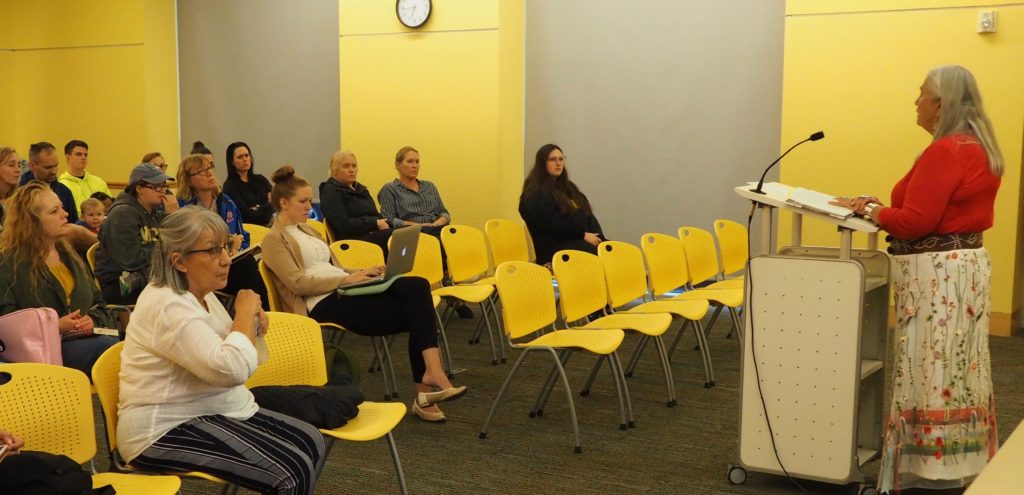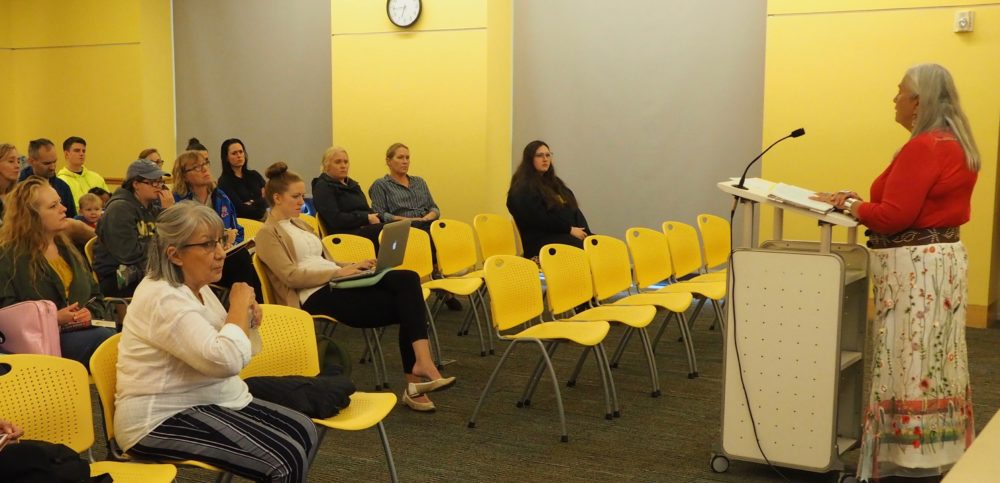Denise Lajimodiere’s non-fiction sheds light on horrors of American Indian boarding schools

Denise Lajimodiere spoke to attendees about the trauma and generational impact of the American Indian boarding school system.
Author and NDSU faculty alumna, Denise Lajimodiere, met fans at the Fargo Public Library on Sept 12 during an event organized by NDSU Press.
During the event, Lajimodiere read from her latest non-fiction, “Stringing Rosaries: The History, the Unforgivable and the Healing of Northern Plains American Indian Boarding School Survivors,” for which the event was organized.
Dressed in a ribbon skirt overlaid with floral embroidered tool, studded belt and floral beaded earrings, Lajimodiere first introduced herself in the manner requested by the Turtle Mountain Band of Ojibwe elders for all members of the tribe.
Referencing the cool, rainy weather, Lajimodiere explained an elder once told her that when there was a thunderstorm it was her because of her name, White Thunder Cloud Ikwe.
“Stringing Rosaries” is split into three parts.
The first introduces readers to the history of American Indian boarding schools; How they came to be, Captain Richard Pratt’s model and briefly eludes to the psychological impact of the survivors.
The second contains the stories Lajimodiere collected from survivors over 12 years of interviews throughout the Northern Plains.
During the event, Lajimodiere read excerpts from multiple of these stories. Tales of molestation, deaths from “failure to thrive,” inhuman abuse and cold indifference were common themes.
The story that gave the book its title was also read. It told the story of a girl who would help string rosaries to be put in “begging letters” asking for donations.
Ramona Kline, one of the survivors interviewed, was in attendance. Lajimodiere broke down when she read an excerpt from Kline’s story.
Kline is also the poet of the poem included at the front of the book, and agreed to read it for the audience. She stood strong, gaze steady, voice wavering with pain and anger as she recited her powerful poem.
Lajimodiere also read some of what were considered “brighter” parts of some of the survivors’ experiences.
“I always tried to ask them if there was a teacher, nun or priest that was good to them or what they did for fun. I asked them if there was a good memory of their time spent in boarding school,” Lajimodiere explained to the audience.
“There were very few,” she continued.
One such story Lajimodiere shared included making their own “ice slide” on a hill and using paper or crates as sleds.
The final section is titled “The Healing” and is dedicated largely to Lajimodiere’s father. “Through the journey of writing this book, I feel I can finally understand why my father was the way he was,” she explained.
Lajimodiere’s father was an abusive drunk, who never showed affection. She told the audience his behavior had everything to do with his experiences at the Chemawa Industrial School.
The last part of the book also talks about what healing would look like, what would need to be done for it to begin.
Is it a government apology? Some of those interviewed say this would at least give recognition of the decades of wrongs committed.
Others say it is too little, too late.
